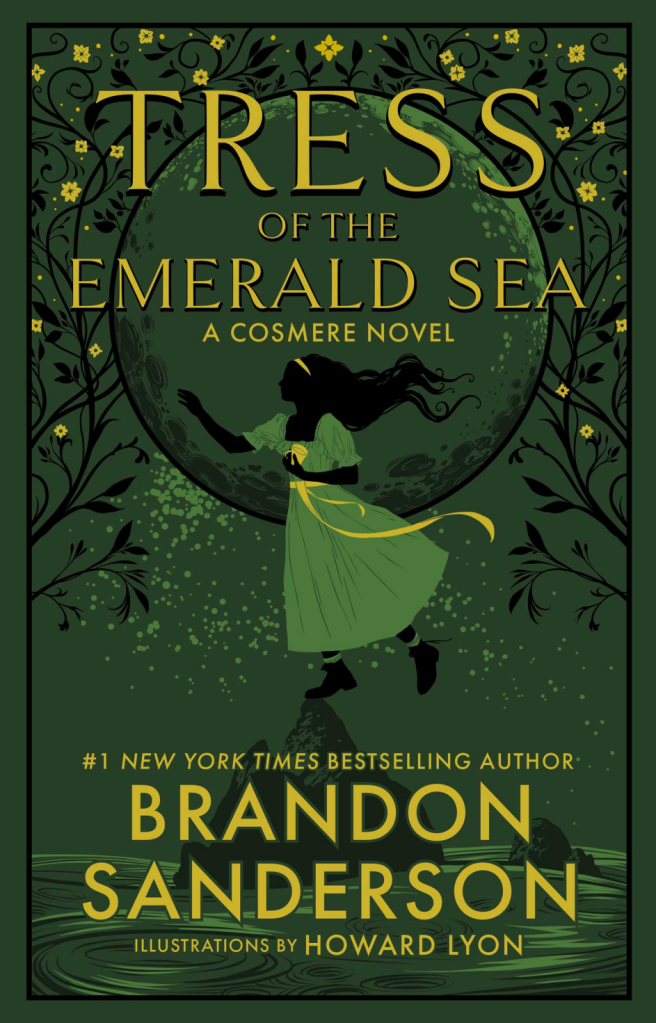

I recently finished Brandon Sanderson’s latest Cosmere book, Tress of the Emerald Sea. Like all his books, this one is full of tangential tales and side trips into philosophy, science, and whatever strikes his wide-ranging fancy in the moment. Sanderson is witty without being arrogant and patronizing. His characters are never contrived. His worlds are extraordinary but comprehensible and tangible. There may be magic, but it falls into the category of ‘known phenomena humans have not yet learned how to explain’ rather than the pure fancy of riding broomsticks and turning unpleasant acquaintances into toads. There is also quite a lot of social commentary, particularly in this one. Maybe Brandon is getting old…
Tress is an ordinary girl who collects cups and prefers lukewarm tea. She is neither pretty nor witty. She loves her family and her home and doesn’t suffer much abuse other than mundane taunting from mean girls. She is not angsty and sarcastic, nor is she insufferably optimistic. She may not have high expectations of the world, but she is never despairing. She is resourceful, thoughtful and heroically pragmatic. She does not like to impose upon others, and this is her one nearly fatal flaw.
Tress is set most reluctantly upon a quest, facing mortal danger and perilous beauty. She finds allies, friends, enemies and many Dougs (no, I will not explain, you just have to read it…). She learns lessons and finds new meaning in life. And then she goes home. Because there is no logical tale involving Tress that does not include a happy homecoming, though both Tress and home are seen in new ways by the end of the story.
But one riff is repeated throughout the tale. Tress works with her hands. She cleans. She cooks. She makes advanced weaponry that incapacitates rather than kills. When she falls in with pirates, she saves her life by grabbing the nearest bucket and scrubbing the deck. Tress is a laborer. She owes her life to this manual labor. All those she saves owe their lives to her laboring. Because all her best ideas come to her while her hands are occupied and her brain is allowed to roam free.
Brandon makes almost a mythos out of this manual work. And somewhere near the middle of the book, he says something that made me stop reading and reevaluate priorities.
The narrator of the novel is a whimsical character who has clearly seen quite a lot of the universe. This person is a bard and cannot restrain himself from delivering long asides and poignant reminiscences and frequent bouts of dubious sartorial advice. In one of the more lucid digressions, the narrator delivers a soliloquy on manual labor that can stand in the ranks of the best of English literature.
He begins by pointing out that we often sneer at those who work with their hands, considering them stupid, while we believe those who work with their minds are superior. But, he says, it is far easier to be creatively intelligent when your hands are occupied and your mind is free. Moreover, what you create with your mind when you work with your hands is your own, it is done on your own time and belongs to nobody but you. What is created with the mind as part of a job belongs to that job.
You work with your body all day and, provided you are not doing life threatening labors, your evenings are free to make music, poetry, friendships, astonishing inventions, really good soup. Your body might be tired, but your mind is awake and brimming with energetic thought. However, those who work all day at accounting or scribing or trying to make themselves heard around a boardroom table of pompous windbags come home in the evening with no thoughts left except to find bit of food and collapse into a warm bed. They have no thoughts beyond the mind-numbing mind work they grind out all day. They could no sooner create wonders than they could stoop to washing their own windows and swabbing their own decks. They garner respect and rewards for doing very little. And they rarely have an original thought to spare for the world, because all their thinking is used up and owned by their jobs. Point being that these people we admire so much that we give them all our attention and money are physically and mentally and legally incapable of producing anything for the wider world. And we are relying on them to innovate us out of all our problems, most of which they created in doing their jobs.
Sanderson might be romanticizing manual labor just a bit… I’ve had jobs that turned both body and mind into a puddle of aching black goo by the end of the workday. I’ve also had at least one mind work job that was a continual fountain of creativity in all sorts of directions. But there is no doubt that I get my best ideas while washing the dishes and hanging up the laundry and pulling the garden weeds. There is also a noticeable drop in my ability to be creative in my present occupation, which is heavy on the accounting and scribing, with a hefty side dose of efficiently dealing with the confounding problems of others. I come home, eat dinner rather mechanically, tend to one or two necessary tasks, and find myself physically and mentally exhausted by 9pm.
If I could figure out the television system, I would probably be one of those people who zoned out in front of a screen until I passed out on the sofa. Fortunately, I haven’t figured it out and refuse to put enough thought into it to remedy that. So I read. And since reading Tress, I’ve noticed how I was in imminent danger of slipping into zombie land. I hope that by noticing, I can somehow fix this problem. Without losing my job, that is.
I don’t love my job. But I do love being able to walk to work and doing work that is fairly necessary to my community. So I don’t want to quit. But I also don’t want to be an office zombie. I wonder if the solution is to not invest so much creative thought, so much of myself, into the job. Or allot it just enough to be useful in the moment. And then forget about it. I have not yet figured out how to do that…
But I am aware of the perils of zombification now, thanks to Sanderson. And fortunately, it is summer. So there are several hours of sunlight after I get off work. This means I have time to get out and do some body labor and give my mind a rest. I may have to force my body to do it because I really am exhausted at the end of the day. But that exhaustion is largely mental. My body is not being used. If I can overcome the mental block to starting, I usually find that I have energy to keep going for quite a while. It will be harder when it is cold and dark before I leave the office, but maybe by then I will have better habits in place.
In any case, I’ve been inspired to notice and consider my daily living. I have made adjustments and will continue to make more. I have found meaningful and applicable lessons in Sanderson’s story. And I can’t think of higher praise for a work of literature.
©Elizabeth Anker 2023



Oh, sounds good. Plus the cover is also pretty. Is this a standalone book, or does one need to have read other Cosmere books?
LikeLiked by 1 person
All his Cosmere books work just fine alone. I’ve read a few and have never felt like I was missing something. He really is a great writer in that respect!
LikeLiked by 1 person